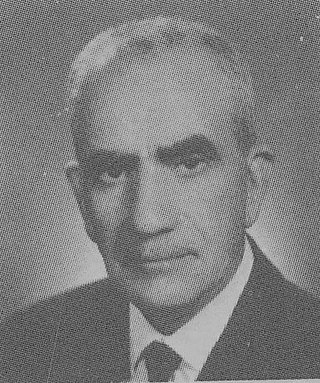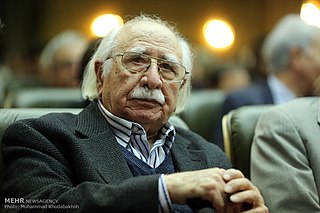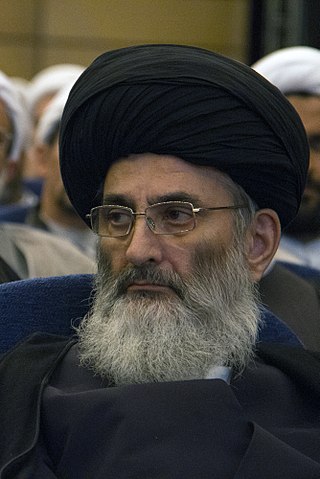
Seyed Mohammad Mehdi Seyed-Salehi, is a former Iranian football player. He usually played as a striker.

Order of Merit and Management is an Iranian state expertise order established by "Council of Iran Ministers" in November 21, 1990. The order has three classes, and awarded by President of Iran. According to Article 9 of the Regulations on the Awarding of Government Orders of Iran, the Order of Merit and Management is awarded to people who achieve "an exceptional success in management, distinguished activities, aiding the oppressed and deprived people and/or beneficiary use of utilities and/or offering exquisite ways".

Order of Service is an Iranian state general order. For the first time, it was established and awarded during the Pahlavi dynasty and during the reign of Reza Shah. After Iranian Revolution it was re-established by "Council of Iran Ministers" in November 21, 1990. The order has three classes. According to Article 12 of the Regulations on the Awarding of Government Orders of Iran, the Order of Service awarded by President of Iran to recognize "achieving distinguished success" in one of the following:
- Truly and consistent efforts in accomplishing responsibility and servitude
- Aiding the oppressed and deprived people

Order of Courage or Bravery is an Iranian state general order established by "The Council of Iran Ministers" on November 21, 1990. The order has three classes. According to Article 14 of the Regulations on the Awarding of Government Orders of Iran, the Order of Courage awarded by President of Iran to recognize "courage, a high class characteristic of human in achieving distinguished success" in one of the following:
- Volunteer to accomplish a difficult task which is critical for the country
- Accepting a serious state mission or a social duty that is accompanied by potential threats
- Opportune use of physical power and skills to reach a high goal

Order of Culture and Art is an Iranian state general order established by "Council of Iran Ministers" on November 21, 1990 and modified on June 27, 2007. The order has three classes and awarded by President of Iran. According to Article 17 of the Regulations on the Awarding of Government Orders of Iran, the Order of Culture and Art is awarded to those who "facilitate theirs thinking, passions and emotions to express deep Islamic and humanitarian concepts and to spread culture" in one of the following ways:
- Disseminating rich Islamic culture and eliminating society from foreign decadent culture
- Expanding the theoretical and disciplinary foundations of religious education
- Expanding national culture and revitalizing valuable social traditions
- Expressing creativity and presenting exquisite works of art or literature
- Pay particular attention to the country's cultural, artistic or literary heritage, so as to be effective in its restoration, preservation and utilization
- Introducing, describing, explaining, critiquing and presenting one of the artistic or literary disciplines internationally
- Inventing a new style in one of the artistic or literary disciplines
- Promote a culture of sacrifice and martyrdom in the community
- Creating remarkable and valuable artworks to convey the ideals and values of the Islamic Revolution and the Sacred Defense to future generations
Eghtesad online in Persian is the first economic news agency in Iran which reviews news and provides analyses on economic issues in two languages: Persian and English. This economic news agency does not have any affiliation with Iran government or political parties & is financially independent.
Order of Knowledge is one of the badges of honor in Iran. Its establishment dates back to the Qajar dynasty era under the name of "Order of Science" that later in Pahlavi dynasty era its name changed to "Order of Knowledge". Finally, it was reestablished in Islamic Republic era by "Council of Iran Ministers" on November 21, 1990.
Order of Research is one of the badges of honor in Iran, established by "Council of Iran Ministers" on November 21, 1990. According to "Article 8" of the "Regulations on the Awarding of Government Orders" of Iran, the "Order of Research" is awarded to individuals who have been the origin of fundamental transformation or rare service in the following ways:
- Introducing new research methods and techniques
- Studies and research that are the source of scientific change
- Finding new research methods
- Transfer of fundamental research to applied fields
- Every important innovation, originality, invention, and discovery
Abdolmohammad Ayati was an Iranian author, translator and researcher in the field of philosophy, history and Persian and Arabic literature. He was born on 5 May 1926 in Borujerd, Borujerd County, Lorestan Province, Iran and died on 11 September 2013 in Tehran, Iran. He was selected at the second Iran's Book of the Year Awards for Arabic to Persian translation of the book History of Arabic Language Literature.

Payam Salehi, is an Iranian singer and guitarist, and is a founder and main member of the band Arian.
Esmaeel Azar or Amir Esmaeel Azar is a professor of Persian literature and director of the Department of Persian Language at the Islamic Azad University, Science and Research Branch, Tehran, and director of the Farhangban Cultural and Artistic Institute. He also works as a presenter on literary programs on Iranian television, including the "Watching the Oath and the Beginning of the Word". He is a member of the Art commission at the Supreme Council of the Cultural Revolution, Director of the Persian Literature Department at the Economic Cooperation Organization, Member of the Naming Committee at the National Organization for Civil Registration of Iran, member of the scientific commissions of the Public Libraries of Iran and a member of the board of directors of the Comparative Literature Association of Iran.

Mohammad Taghi Modarres Razavi distinguished Professor of University of Tehran, was an Iranian Literary researcher and author. He was born in Mashhad, Razavi Khorasan Province, Iran on March 18, 1896, and died on November 19, 1986, in Tehran, Iran.

Fathollah Mojtabaei is an Iranian author and historian. He is a permanent member of Academy of Persian Language and Literature and a member of the faculty of the Center for the Great Islamic Encyclopedia.

Bibliography of Rasul Jafarian is a list of books published by Rasul Jafarian, cleric, translator, writer and researcher of Iranian history.

This is a bibliography of the works of Morteza Motahhari.

Poopak Niktalab is an Iranian education theorist, author, and literary researcher, especially of children's literature.

Mahmoud Mar'ashi Najafi or Seyyed Mahmoud Mar'ashi Najafi is an Iranian librarian, Bibliographer and manuscript expert. He is the director of Mar'ashi Najafi Library, which he says is one of the largest libraries in Iran and the world.

Bijan Bijani is an Iranian singer and calligrapher. His most famous work is the song "The Concealment of the Heart".

Seyed Reza Bahaadini was an Iranian Shia jurist, teacher of ethics and practical mysticism. He was one of the disciples of Abdul-Karim Haeri Yazdi, Seyyed Mohammad Hojjat Kooh Kamari, Seyyed Mohammad Taghi Khansari and Hossein Borujerdi. His greatest occupation and fame was his public or private debates on Islamic ethics courses, which lasted until the last days of his life.

Seyed Abdol Javad Alamolhoda was an Iranian ayatollah. He is the older brother of Ahmad Alamolhoda, the Friday prayer leader in Mashhad. He was also the founder of Al-Qaim Seminary in Tehran.















